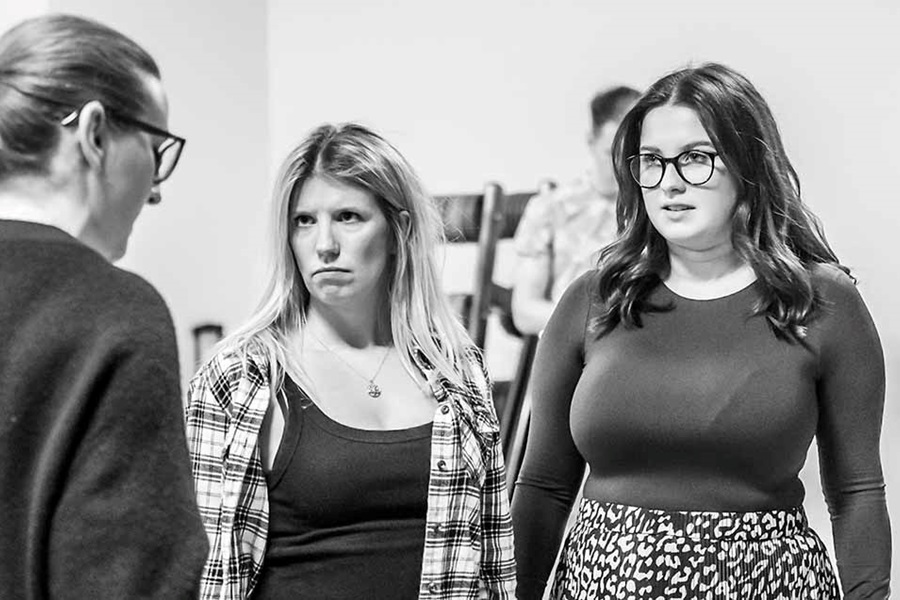Director, Cat Nicol, tells us about the history of 'Carousel' and how Rodgers and Hammerstein pioneered a new kind of musical theatre.
Where does creative inspiration come from? How do composers and writers decide what topic will make a good musical?
In modern times, musicals have often tackled difficult subjects. From stories of the ‘plane people’ in the aftermath of 9/11, to the conviction and lynching of a Jewish man in 1915 Georgia, to a Vietnamese woman leaving her child at a US Air Force Base during the fall of Saigon - all of these true life events inspired compelling, award winning musicals, despite their distinctly dark topics. But this wasn’t always the case.
The early musicals of the 20th century were very different to the ones we see today: light in nature, comedic rather than dramatic, featuring big production numbers and speciality acts. But in 1927 came Show Boat, a collaboration between Oscar Hammerstein II and Jerome Kern, and the first ‘book’ musical where song and dance were integrated with story. Show Boat paved the way for the evolution of musical theatre although it wasn’t until Hammerstein’s first musical collaboration with Richard Rodgers, Oklahoma! in 1943 that it really took off. At a time when audiences were looking for escapism and respite from WW2, Oklahoma! with its cohesive storyline, wonderful songs, and narrative through movement, was not just a crowd pleasing revelation: it won a Pulitzer Prize special award and changed the musical theatre landscape forever. Oklahoma! heralded the start of the golden age of Broadway musicals and the beginning of one of the most influential and successful musical theatre partnerships.

After the huge success of Oklahoma! one can imagine that the decision on what show to do next would have been a difficult one. But Rodgers and Hammerstein found their inspiration in an unusual play called Liliom. Set in Budapest, featuring a womanising, abusive anti-hero who commits suicide after being caught during an armed robbery, leaving his new wife pregnant and widowed, and then ends up in the backyard of heaven before ultimately being sent to purgatory, Liliom was not obvious musical theatre material! Liliom was written by Hungarian writer Ferenc Molnar in 1909 but when it was first performed the Budapest audience didn’t know quite what to make of it. With its dark story, complex characters, and decidedly unhappy ending, the audience voted with its feet and a few weeks later it had closed. However a revival on Broadway a few years later was a surprising success and this led to a renewed interest in Molnar’s play and ultimately to its most famous adaption - Carousel.
Molnar had already turned down requests from Puccini and Kurt Weil to adapt Liliom. But after Molnar saw Oklahoma! he agreed to give the rights for Liliom to Rodgers and Hammerstein and also allowed them to change key elements of the story, including moving the action from Budapest to New England. Hammerstein instigated one other significant change to the story. Both Liliom and Billy Bigelow (the Liliom of Carousel) get the chance to go back to Earth for one day to meet their daughter Louise but while they both make a mess of this meeting, Liliom is sent back to serve his time in purgatory while Billy gets given one more chance to make things right - for Louise and for his wife, Julie.

For Hammerstein, redemption was an essential part of Carousel:
“It was not the anxiety to have a happy ending that made me shy away from that original, but because I can’t conceive of an unregenerate soul- and to indulge myself I changed the ending”
Rodgers also wrote about the reasoning behind the ending change:
“Liliom was a tragedy about a man who cannot learn to live with other people. The way Molnár wrote it, the man ends up hitting his daughter and then having to go back to purgatory, leaving his daughter helpless and hopeless. We couldn't accept that. The way we ended Carousel it may still be a tragedy but it's a hopeful one because in the final scene it is clear that the child has at last learned how to express herself and communicate with others.”
The redemption of Billy Bigelow has been one of the great musical theatre debates of the 21st century! The reason for redemption may have been acceptable in 1945 but there has been a considerable shift in attitudes in the intervening years. Why give redemption to a man who appears to have little to no redeeming qualities? Why forgive a man who hits his wife and can’t control his anger? Were Rodgers and Hammerstein simply trying to excuse the excesses of male behaviour? Why must the man who caused Louise’s problems also be the man who saves her from them? These questions have caused much consternation over the years as theatre makers have tried to strike a balance between remaining true to the source material and presenting a production that does not condone or romanticise domestic violence.

But the truth is that we can only view Carousel through the prism of the present. As much as we try to modernise productions and stage them in such a way as to enable more of a connection with the audience, musicals such as Carousel were written in a different time, when the world was a very different place. We have in Carousel a work that is imperfect in its message by today’s standards and yet, if we can accept this imperfection, we can see it still has much to offer a modern day audience, including some of the most beautiful music ever written.
Ultimately Carousel is a fascinating exploration of human nature and how our experiences on this merry go round called life shape our response to love and death and everything in between. And perhaps this is why Liliom inspired Rodgers and Hammerstein. For it gave them the opportunity to take a truly challenging and emotive story and push musical theatre to new boundaries. In doing so, they created one of the most iconic musicals of the 20th century which, despite its controversial storyline, continues to both confound, thrill, frustrate and delight audiences almost 80 years later.
Carousel runs at the ADC Theatre from Tuesday 04 April 2023. With limited availability for select performances, get your tickets now here.

